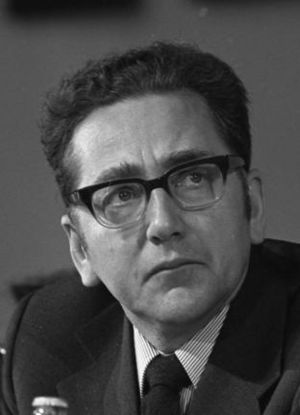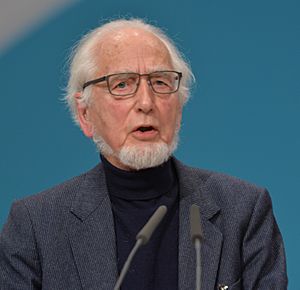Erhard Eppler facts for kids
Quick facts for kids
Erhard Eppler
|
|
|---|---|
 |
|
| Minister for Economic Cooperation | |
| In office 1968–1974 |
|
| Preceded by | Hans-Jürgen Wischnewski |
| Succeeded by | Egon Bahr |
| Personal details | |
| Born | 9 December 1926 Ulm, Weimar Republic |
| Died | 19 October 2019 (aged 92) Schwäbisch Hall, Germany |
| Political party | Social Democratic Party |
| Occupation | Teacher |
Erhard Eppler (born December 9, 1926 – died October 19, 2019) was an important German politician. He was a member of the Social Democratic Party (SPD). Eppler also helped start the German Agency for Technical Cooperation (GTZ).
He studied English, German, and history at universities in Frankfurt, Bern, and Tübingen. He earned a PhD and worked as a teacher. Later, he met Gustav Heinemann, who became a big inspiration for him.
Eppler served in the Bundestag, which is Germany's parliament, from 1961 to 1976. From 1968 to 1974, he was the Minister for Economic Cooperation. This role involved helping other countries develop. He served under Chancellors Kurt Georg Kiesinger, Willy Brandt, and Helmut Schmidt.
Erhard Eppler was one of the first politicians to think about protecting the environment. He also supported peace movements. He was the president of the German Protestant Church Assembly twice.
Contents
Erhard Eppler's Early Life
Erhard Eppler was born in Ulm, Germany, on December 9, 1926. He grew up in Schwäbisch Hall. His father was the headmaster of a local school there.
During World War II, from 1943 to 1945, Eppler served in an anti-aircraft unit. After the war, in 1946, he finished his high school education (called Abitur).
He then went on to study at universities. He studied English, German, and history in Frankfurt, Bern, and Tübingen. In 1951, he earned his PhD. His special research was about plays from the time of Queen Elizabeth I. From 1953 to 1961, he worked as a teacher in Schwenningen.
Eppler's Political Journey
When he was 16, in September 1943, Eppler became a member of the NSDAP. Later, he called this decision "stupidity." He said he accepted being on their list of members because "Things were like that in those times."
While studying in Bern in the late 1940s, Eppler met Gustav Heinemann. Heinemann was one of the people who started the Christian Democratic Union (CDU) party. Heinemann was a minister, but he later left the CDU. He disagreed with Chancellor Konrad Adenauer's plans to fully join the Western world.
Eppler joined Heinemann's new party, the All-German People's Party, in 1952. But in 1956, like many others, he joined the Social Democratic Party of Germany (SPD).
For many years, from 1970 to 1991, Eppler was part of the SPD's main committee. He worked on tax reform plans for the party. He also served on a committee that set the party's basic values. Here, he spoke out against using atomic energy.
From 1973 to 1981, Eppler led the SPD in the region of Baden-Württemberg. He ran to become the head of that state, but his party lost to the CDU in two elections.
Serving in Parliament
Erhard Eppler was a member of the Bundestag, Germany's national parliament, for 15 years. He served from 1961 to 1976.
On October 16, 1968, Eppler became the Minister for Economic Cooperation. He was part of a "grand coalition" government. This was a government formed by two major parties, the CDU and the SPD.
He continued in this role when Willy Brandt became Chancellor in 1969. However, in 1974, the next Chancellor, Helmut Schmidt, cut the budget for Eppler's department. Eppler disagreed with these cuts and resigned from his position in protest.
Eppler's Views and Ideas
Erhard Eppler was always seen as someone on the left side of the SPD party. He believed in social justice and helping others.
Even though he was on the left, he supported some economic changes made by Chancellor Gerhard Schröder in the early 2000s. These changes were sometimes called "neo-liberal."
Eppler was also close to the peace movement in the 1980s. However, he supported Germany's involvement in military actions in Kosovo (1999) and Afghanistan (since 2001).
He was one of the first to talk about protecting the environment. He believed that environmental protection and helping developing countries were connected. In his book Not much time for the Third World, he explained these important links.
Community Involvement
After leaving national politics, Eppler became more involved with the Protestant Church. He was the president of the Deutscher Evangelischer Kirchentag (German Protestant Church Congress) twice. This is a large gathering for Protestants in Germany.
Eppler was also a member of the Wacholderhof Association. This group works to promote international cooperation, fair trade, and environmental protection.
He wrote many books that showed his political and social interests. His books covered topics like German politics, the economy, and how society changes. In 2006, one of his books about the role of the state won an award called Das politische Buch 2006.
Images for kids
 | Leon Lynch |
 | Milton P. Webster |
 | Ferdinand Smith |



